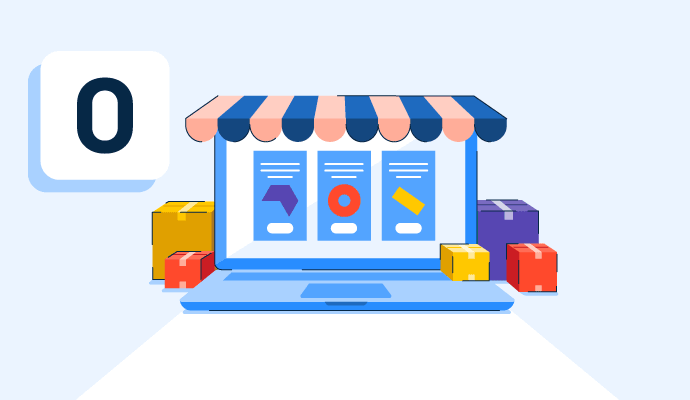What is an online marketplace?
An online marketplace is a digital platform that brings together multiple sellers and buyers, enabling them to engage in online buying and selling activities.
These platforms facilitate transactions between buyers and sellers, often providing tools and features such as product listings, search functionality, secure payment processing, customer reviews, and seller profiles.
Marketplace software, also called multivendor marketplace software, helps create and manage online marketplaces that host product and service listings from multiple vendors. Although it is considered an e-commerce platform, its distinction comes from the market that is targeted. While e-commerce platforms are single-seller focused, marketplace platforms are multi-seller focused.
Types of online marketplaces
Depending on the industry, business model, and customer needs, online marketplaces come in various types. Here are some of the common types:
- Vertical marketplaces: These marketplaces serve a specific industry, product category, or interest area. They often cater to a specific target audience with unique needs or preferences. Examples may include a marketplace to buy and sell musical instruments or home improvement and design.
-
Horizontal marketplaces: Unlike vertical marketplaces that cater to a particular industry or interest, horizontal marketplaces span across a wide range of products, categories, services, or industries.
These marketplaces often aim to be comprehensive and all-encompassing, providing users with a one-stop shop for various needs. -
Service marketplaces: Service marketplaces connect service providers or freelancers with potential clients or customers. In a service marketplace, individuals or businesses can offer their skills, expertise, and services, and customers can find, compare, and hire the right service providers for their needs.
A few examples marketplaces that offer freelance services, creative and professional services, and local services.
Benefits of using an online marketplace
The online marketplace can offer numerous benefits for both buyers and sellers. Here are some of the key benefits for both buyers and sellers.
For buyers
- Variety and choice: Online marketplaces provide a wide range of products and services from different sellers and scope to compare products and find the best-suited ones.
- Reviews and ratings: They often feature authentic customer feedback, providing insights into the quality and reliability of products and sellers.
- Secure transactions: Online marketplaces typically offer secure payment processing, protecting buyers' financial information.
For sellers
- Broader customer base: Sellers can reach a wider audience on online marketplaces, potentially expanding their customer base from local to global.
- Streamlined operations: It comes with pre-built features to help businesses focus on sales and revenue and worry less about backend operations.
- Easier market entry: New businesses can easily join an established online marketplace and start doing business instead of building their own e-commerce website and managing it.
Impacts of using an online marketplace
The online marketplace can significantly impact various aspects of business, consumer behavior, and the economy as a whole. Here are some of the key impacts:
- Increased reach: Small and medium-sized businesses can easily expand their reach to a larger and more diverse customer base, including domestic and international markets.
- Cost reduction: Businesses can save on overhead costs associated with physical stores, such as rent, utilities, etc., and eliminate the burden of running an e-commerce website.
- Competition and innovation: It provides brands with a platform to compete with their competitors. It also helps companies to innovate more to win the game in the marketplaces.
- Consumer insights: Marketplaces are the best platforms to capture ever-changing consumer behavior. It helps generate valuable insight needed for consumer research.
Basic elements of an online marketplace
An online marketplace comprises several essential elements that work together. Here are the basic elements that collectively form this digital platform:
- Seller and buyer account: Both buyers and sellers create accounts on the marketplace. These accounts allow users to access the marketplace and other features such as order history, personal information, delivery address, etc.
- Product or service listings: Sellers create listings for their products or services. Each listing includes product or service descriptions, images, prices, and other information.
- Search and filtering: Online marketplaces offer search and filtering options to easily find a product without wasting significant time browsing multiple categories.
- Reviews and ratings: Customers can leave reviews and ratings for products or services they've purchased or used. These reviews guide other buyers' decisions and contribute to the credibility of sellers.
- Payment processing: Online marketplaces offer secure payment gateways that allow buyers to make payments for their purchases. It also asks permission from users to save user credentials for quick checkout in future purchases.
- Shopping cart: A shopping cart allows buyers to add and adjust products they wish to purchase. It also helps sellers by sending cart abandonment emails to buyers and helping them close the sale.
- Order management: Sellers and buyers can track orders, view shipping status, and communicate order details through the marketplace platform.
Online marketplace best practices
To make an online marketplace work, follow these best practices:
- User-friendly interface: Design a clean, intuitive, and user-friendly interface that makes it easy for users to navigate and spend time on the platform.
- Trust and safety policies: Implement measures to verify sellers' identities, secure payment transactions, brand protection guidelines, and protect user data.
- Customer support: Offer responsive and efficient customer support to promptly address and resolve user complaints and issues.
- Mobile optimization: Ensure the marketplace platform is optimized for mobile devices, as many users shop and interact on smartphones.
- Marketing and promotion: Investing in marketing efforts is essential to online marketplaces as it’s a motivation behind seller onboarding and user engagement.
Learn more about the hottest trends in the e-commerce industry for 2023.

Subhransu Sahu
Subhransu is a Senior Research Analyst at G2 concentrating on applications technology. Prior to joining G2, Subhransu has spent 2 years working in various domains of marketing like sales and market research. Having worked as a market research analyst at a renowned data analytics and consulting company based in the UK, he holds expertise in deriving market insights from consumer data, preparing insight reports, and client servicing in the consumer and technology domain. He has a deep inclination towards tech innovation and spends most of his time browsing through tech blogs and articles, wiki pages, and popular tech channels on youtube.

